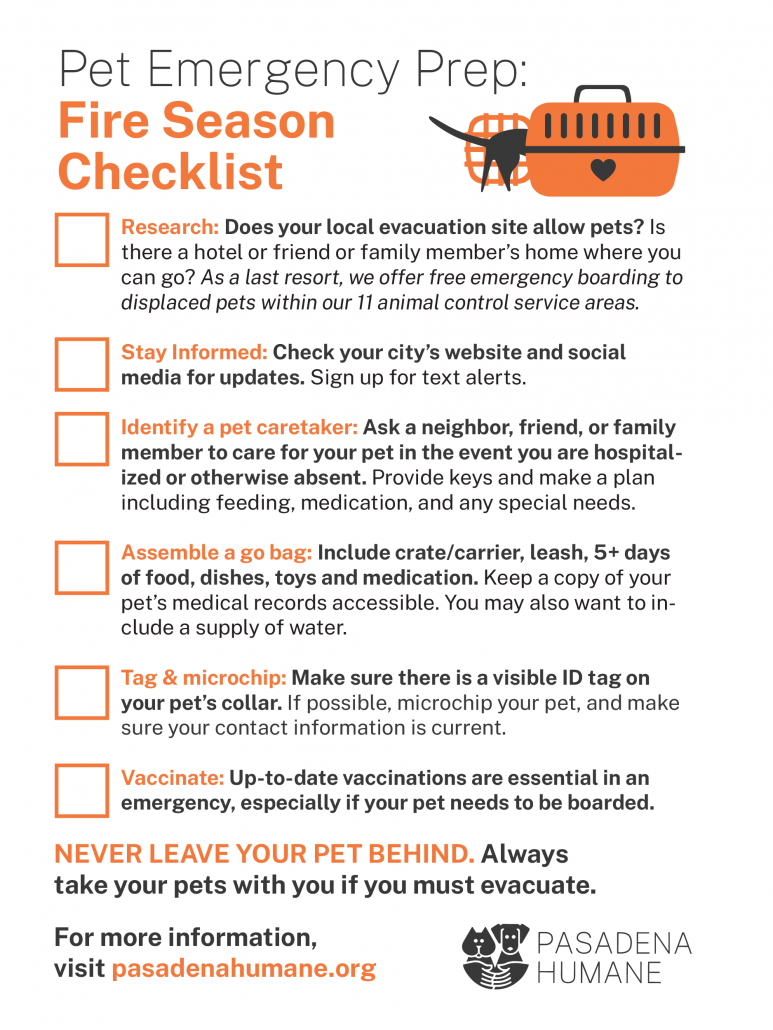Pet Emergency Prep
With the threat of the Bobcat Fire looming and the upcoming fire season, it’s important to be ready to evacuate at a moment’s notice. Remember to always take your pets with you!
Be sure your emergency plans include your pet with these tips:
Plan Ahead
Know where your local evacuation sites will be and if they allow pets. Many evacuation shelters do not accept pets, so it’s important to have an alternative plan in place. Research pet-friendly hotels or identify an out-of-town friend or family member that will host you and your pets. As a last resort, we offer free emergency boarding to displaced pets within our 11 animal control service areas.
Be ready to leave and take your pets
Stay up to date at all times during an emergency. Your city’s website and social media will be your best guide for emergency communications. We also recommend you sign up with your city’s emergency response notification system to get text alerts.
Arcadia- Website Twitter Public Safety Alert Sign-Up
Bradbury- Website Public Safety Alert Sign-Up
Glendale- Website Facebook Twitter Public Safety Alert Sign-Up
La Canada- Website Facebook Twitter Public Safety Alert Sign-Up
LA County (Altadena, La Crescenta)- Website Facebook Twitter Public Safety Alert Sign-Up
Monrovia- Website Facebook Twitter Public Safety Alert Sign-Up
Pasadena- Website Facebook Twitter Public Safety Alert Sign-Up
San Marino- Website Facebook Twitter Public Safety Alert Sign-Up
Sierra Madre- Website Facebook Public Safety Alert Sign-Up
South Pasadena- Website Facebook Public Safety Alert Sign-Up
Identify a pet caretaker
If you become ill or hospitalized, it’s important to have someone available who can care for your pet in your absence. This can be a friend, family member, or neighbor, but above all make sure you’ve discussed your plans with this person and let them know about any special needs your pet may have, such as medication or a feeding schedule. Providing your pet caretaker with a spare set of house keys ensures that they will be able to access your pet in an unexpected emergency.
Assemble a go bag
Have crates or carriers, leashes, wet and dry food (at least five days worth), dishes, a few toys, and your pet’s medicine packed up in an easy-to-carry bag. Add a supply of water, and this bag is also useful in the event of a natural disaster, evacuation, or anything that requires you leave quickly with your pet.
Tag and microchip
Although a collar with a visible ID tag and a microchip are always encouraged, it’s especially important during an emergency. If your pet gets lost, a tag and microchip can make it more much likely that they’ll be returned to you. If you’ve moved or changed your phone number, always check that your pet’s ID tag and microchip have been updated with the correct information.
Keep vaccines up-to-date
If your pet needs to be boarded, they must be up-to-date on their vaccines. Check with your local veterinary office to see if they’re offering vaccine services at this time. Always keep a copy of your pet’s medical records in their go bag or somewhere easy to find so you can provide this information when asked.
If you are not at home:
Make arrangements in advance with a trusted neighbor who can take your pets to safety.
Large Animals:
Ideally, you will have enough trailers or travel containers for all the animals on your property. Make arrangements with a boarding facility or friend with a farm or ranch in a different area. LA County will also open evacuation centers for large animals during an emergency.




